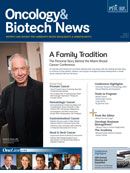Publication
Article
Oncology & Biotech News
Baseline Glucose Levels in Older Women May Be Linked to Colorectal Cancer Risk
Author(s):
New findings suggest that increased serum glucose levels may be a risk factor for colorectal cancer in postmenopausal women.
Geoffrey C. Kabat, PhD
New findings suggest that increased serum glucose levels may be a risk factor for colorectal cancer in postmenopausal women.
Geoffrey C. Kabat, PhD, senior epidemiologist at Albert Einstein College of Medicine, Bronx, New York, and associates conducted a longitudinal study of colorectal risk in women in whom fasting blood samples obtained at baseline and at several time-points during a 12-year follow-up were analyzed for insulin and glucose.
The analysis included 4902 nondiabetic women who were enrolled in the Women’s Health Initiative study, a large prospective, multicenter study that focuses on strategies for preventing heart disease, breast and colorectal cancer, and fracture in postmenopausal women aged 50 to 79 years.
Several epidemiologic studies have examined the association of colorectal cancer with circulating insulin and/or glucose levels. However, all but 1 study has included only baseline measurements. In addition, few studies have analyzed homeostasis model assessment of insulin resistance (HOMA-IR), a more direct measure of insulin resistance than fasting insulin alone.
Women included in the current analysis were stratified into 3 groups on the basis of their baseline glucose level. One group had a baseline glucose level <89.5 mg/dL-1, a second group had a baseline ranging from 89.5 to <99.5 mg/dL-1, and a third group had a baseline glucose level ≥9.5 mg/dL-1.
“
It’s possible that elevated glucose levels are linked to increased blood levels of growth factors and inflammatory factors that spur the growth of intestinal polyps, some of which later develop into cancer. ”
—Geoffrey C. Kabat, PhD
Overall, 81 incident cases of colorectal cancer were identified during follow-up. Of these, 65 cases had colon cancer, 6 had cancer of the rectosigmoid junction, and 10 had rectal cancer.
Women in the highest tertile of baseline glucose levels were nearly twice as likely to develop colorectal cancer during follow-up as women in the lowest third (multivariate-adjusted hazard ratio [HR], 1.74; 95% CI, 0.97-3.15 and 2.25; 95% CI, 1.12-4.51, respectively). The results were maintained on repeat glucose testing throughout follow-up.
Insulin and HOMA-IR were not associated with colorectal cancer risk.
Kabat pointed out in a news release that future research needs to focus on identifying the mechanism by which chronically raised serum glucose levels may promote the development of colorectal cancer. “It’s possible that elevated glucose levels are linked to increased blood levels of growth factors and inflammatory factors that spur the growth of intestinal polyps, some of which later develop into cancer,” he said.
Kabat GC, Kim MY, Stricker HD, et al. A longitudinal study of serum insulin and glucose levels in relation to colorectal cancer risk among postmenopausal women [published online ahead of print November 29, 2011]. Br J Cancer. 2012;106(1):227-232. doi:10.1038/bjc.2011.512.










